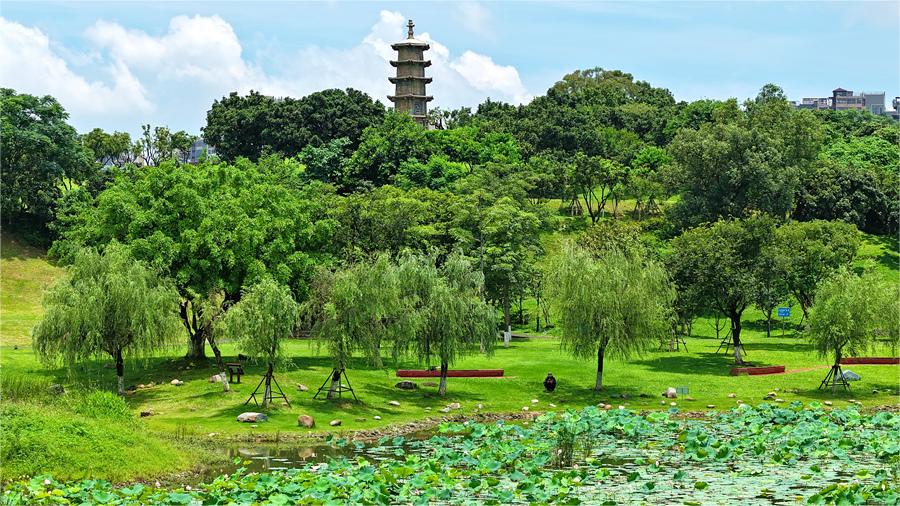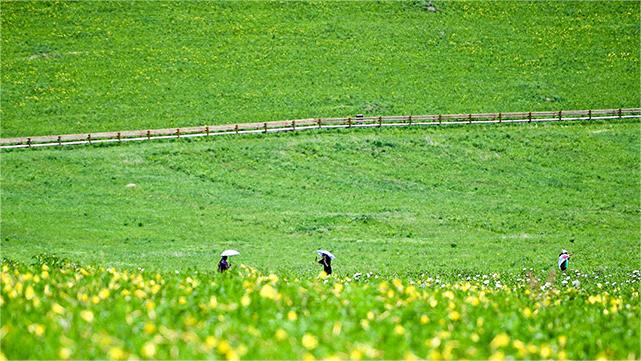US students hope to open minds back home to real China
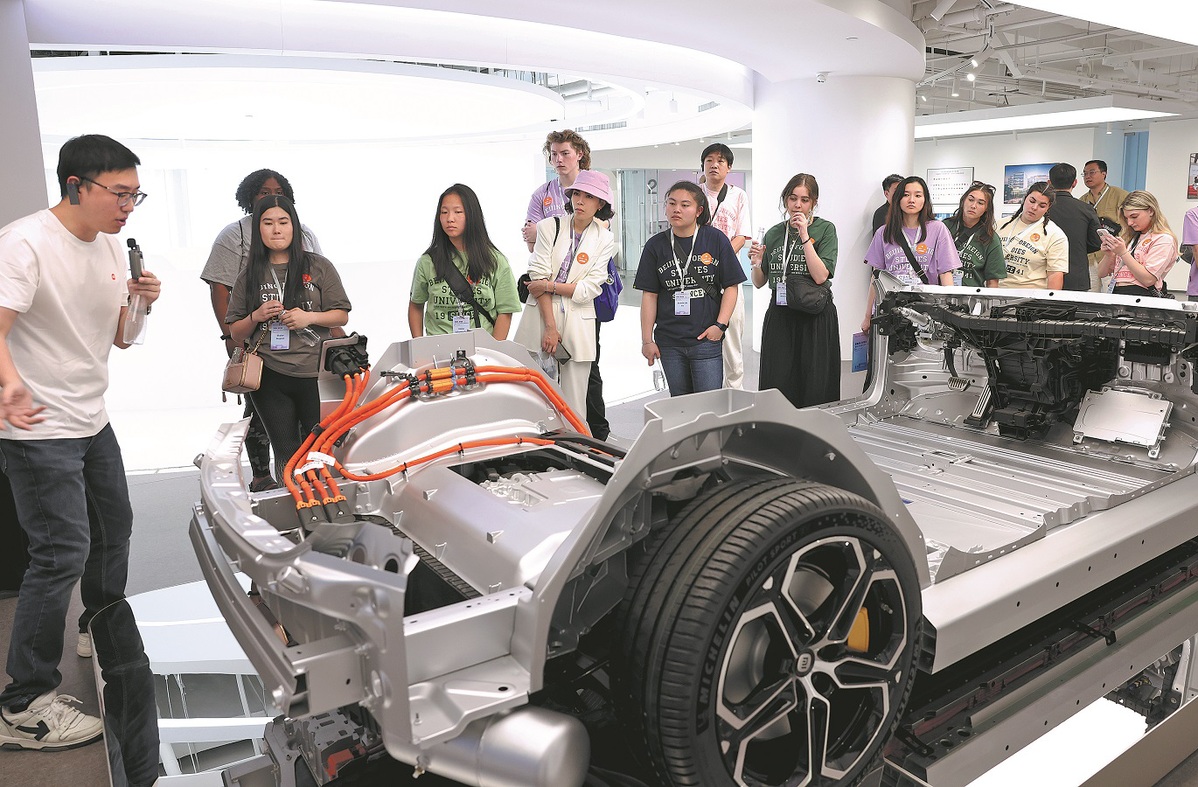
Students from Indiana University of Pennsylvania, the United States, learn about the interior structure of the Xiaomi SU7 electric vehicle at the company's industrial park in Beijing on May 17. (ZOU HONG/CHINA DAILY)
China's initiative to invite 50,000 young people from the United States to visit the country over the next five years is a smart move and will improve China-US relations, according to one of the first groups of US students to participate in the program.
President Xi Jinping proposed the initiative to invite US youths to experience exchanges and study programs during his visit to San Francisco, California, in November.
Fourteen students and a teacher from Indiana University of Pennsylvania were among the first to take part in the program, visiting China from mid-May to late May.
Organized by the Beijing Foreign Studies University, the group visited technology companies such as Xiaomi, experienced Chinese culture in Beijing and Hangzhou, Zhejiang province, and played sports with their Chinese counterparts.
After the trip's closing ceremony on May 26, Caroline Bianco said she was grateful to be a part of the 2024 BFSU Discover China Program.
"I think the initiative is really smart," she said. "Even if our two governments have different positions on core issues, like how they should run their countries or how they govern their people, youth can be the bridge."
Before arriving, Bianco's perception of China was simply of a country with a large population, crowded and busy places, and terrible pollution.
However, the visit changed her mind, and she saved images of what she saw and experienced on her smartphone. She said she would go back home and tell everyone how her experiences differed from her expectations.
"If I show people photos about how these cities are greener than ours, explain about how they cared about the environment or (people's) health, I think some people may understand what I experienced and change their minds," Bianco said.
She was impressed by the hospitality of Chinese people and recalled an experience in a rural area of Hangzhou, where villagers at a tea garden they randomly stopped at served them tea, and allowed them to use the toilet in their house.
"It was something we have never experienced in the US. We wouldn't think about inviting strangers into our houses. It seems like they are really trusting and treat guests with hospitality," she said.
Most of the students had never been to an Asian country before, and they witnessed different aspects of life and culture in China. The eye-openers included the ancient architecture of the Forbidden City, the natural beauty of West Lake as well as modern advances such as the widespread use of mobile-phone payments and the country's high-speed railway network.
Despite the differences, the US students said what is truly important are the similarities both people shared.
"We learned by coming here that people are very similar, even though our cultures are very different. You find you have more in common with someone from a different country like China," Bianco said.
Emma Monday said the initiative is about making a difference in relations between two countries that currently have political tensions. "I think the fact that China is stepping up to take this initiative really shows their efforts to try to repair the relationship," Monday said, adding it is a positive move.
"We are going in the right direction. I implore US citizens to open their eyes, welcome this initiative, and meet China halfway," she said.
Kamir Walton said he was a little nervous about coming to China and was worried that he would get in trouble if he said anything considered improper. "But being here, the first day I knew I had it wrong, or Americans had it wrong," Walton said.
His China experience had made him believe that people-to-people exchanges are what the two countries need and he would like to be part of that bridge, he said.
"This is the first step, and 50,000 young people saying how China is may be enough for a small movement in China-US relations," Walton said.

A student from Indiana University of Pennsylvania tries on Peking Opera costumes at Jixiang Theatre in Beijing on May 17. (ZOU HONG/CHINA DAILY)
Ordinary folk
Professor Liu Shijuan, a Chinese teacher at IUP, invited the students to take part in the tour program as she knows most of them through Chinese language or cultural courses at the university. "Most of them are interested in learning Chinese," Liu said.
As IUP and BFSU had been working on cooperation on postgraduate programs, they had the idea of inviting undergraduate US students to come to China and experience the country in person.
Participants had to meet certain conditions, such as having a passport, being able to afford flight tickets, and a willingness to explore China.
The students, with an average age of 20, are all from "ordinary families" in small cities and some of them had never been on a plane before, Liu said.
"Unlike Chinese parents who may be more supportive in funding their children for exchange programs overseas, many of these American students had to earn their own plane tickets through part-time jobs," she said.
The majority of them found a job near the university. "Most of them had little idea of China — a country far away from their homes," Liu said.
Some of the students flew more than 24 hours to get to Beijing, and one of them only obtained her travel visa on the morning she left.
Monday said she was excited about the trip from Beijing to Hangzhou as it was her first time traveling on a high-speed train.
"I thought it was really convenient because you don't have to pay as much as the airplane. We kept looking at the map and said it was this far from Beijing. We were so amazed by how fast we got there," Monday said.
During their visit to Xiaomi, some of the students said that a Xiaomi SU7, the company's first electric car, which was on display, was the most amazing vehicle they'd ever seen.
Walton kept asking questions about charging the car, but the software engineering student was especially impressed by its striking color. "When I was told the color was scientifically taken from the ocean, I thought I would really like to buy it," Walton said.
A similar vehicle would sell for over $150,000 in the US, while it costs only about 290,000 yuan ($40,000) in China, he added.
Computer science student Kenneth Au said he was curious about how China had been able to shift to an electric vehicle system while its infrastructure still supported fuel vehicles.
"It seems like China can fully convert to a whole electric car system, much better than any American system," Au said.
The cheaper prices of advanced electronic products such as smartphones and laptops also drew the US students' attention.
However, it was the ancient architecture in the Forbidden City and how it fits in with Beijing's modern landscape that got the visiting students most excited.
"As a young country, we don't have ancient structures in the US. It's amazing that one emperor lived in a place literally the size of a city," Walton said.
Kayla Kristchil, who has traveled to Europe, was impressed by the combination of the modern and ancient in Beijing.
She took a picture in the Forbidden City, with the palace in the foreground and skyscrapers in the background.
Bianco was impressed by the architecture and Chinese people's appreciation of history.
"The Summer Palace is really beautiful and the Great Wall is crazy to see in person. It's hard to believe how it was built. The people really appreciate the country's history and where they came from," she said.

A student from Indiana University of Pennsylvania tries on Peking Opera costumes at Jixiang Theatre in Beijing on May 17. (ZOU HONG/CHINA DAILY)
Chinese counterparts
Huo Yi volunteered to be the team leader of the program and spent a large amount of time with the US students while taking care of them during the tour. A doctoral candidate at Dong-A University in South Korea, Huo was in Beijing preparing his thesis defense when he learned about the program from a friend who was one of the visit organizers.
"Their behavior challenged some of my perceptions about American youth," Huo said.
While young US people are often stereotyped as being rebellious, Huo said he found the young visitors to be orderly and on time, and willing to follow all regulations.
A memorable experience was watching a soccer match with them at the Workers' Stadium in Beijing, Huo said.
"Despite rarely watching soccer games in the US, they were extremely engaged and captivated by the live match. This made me deeply appreciate cultural exchange as an excellent way to foster mutual understanding," he said.
Huo said his involvement had allowed him to observe the diverse behavior of young people from different cultural backgrounds.
Some of the US students have deeper connections with China that went beyond an interest in learning the Chinese language. Kenneth Au's father emigrated from Hong Kong to the US in the 1980s, while Emily Schumacher was adopted by a US family in Zhuhai, Guangdong province, when she was three years old.
"Au showed traditional Chinese traits of humility and politeness because of his family background," Huo said. "On the other hand, Emily, affected by her upbringing, would straightforwardly express her views on perceived injustices."
Xie Tao, dean of the School of International Relations and Diplomacy at BFSU who gave a lecture about China-US relations to the US students, said he was impressed by their extremely positive feedback about their experiences in China. All of them said they would recommend to their friends and family to visit the country.
"I firmly believe exchanges between Chinese and American students will help reduce misunderstandings and stereotypes about China that are widespread among American people," Xie said.
"Face-to-face conversation and learning will undoubtedly make American students better appreciate the real China."
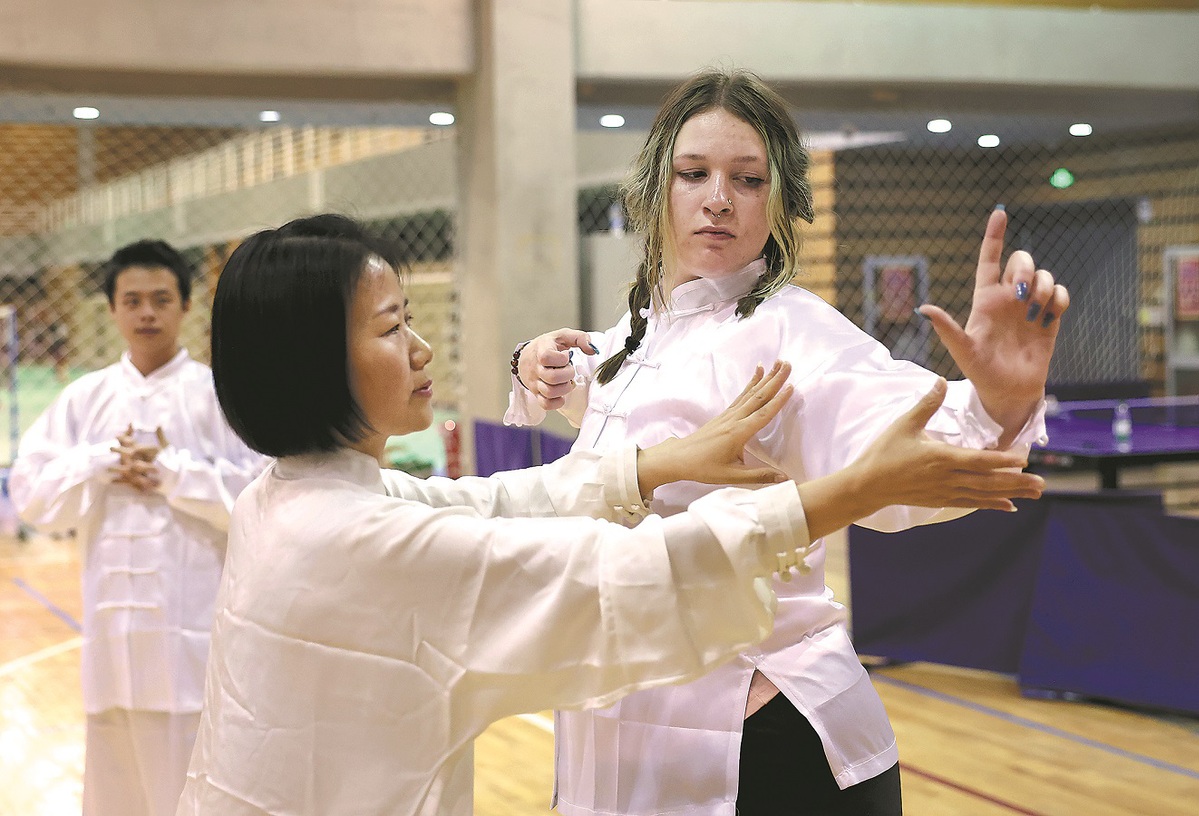
Wang Juan, a PE teacher at the Beijing Foreign Studies University, shows baduanjin exercise movements to US student Emma Monday at the university on May 20. (ZOU HONG/CHINA DAILY)
Optimistic outlook
While interacting with the students during his lecture, Xie asked them a serious question: "Are you more of a pessimist or optimist when it comes to Beijing-Washington relations?"
Walton said after the class that he was pessimistic about relations, but not because of the Chinese people.
"The problem is when we experience stuff and try to make a change after going back, we are criticized. And then we are part of the 'enemy'," he said.
Monday said she is in the minority back home when it comes to attitudes toward China. "I had a difficult time talking about what I observed in China because people who have never experienced the culture are so set on thinking that those who come here are being brainwashed," she said.
"I'm optimistic about the way China is handling this, but as far as the way the US can receive it, I just don't know," she added.
Despite the challenges, the younger generation is more open-minded and willing to embrace ideas, the students said.
Monday said at college, "The majority of people would be very open to strengthening the relationship. In general, younger people are more open to it than older people who already have their mindset".
Tu Xiliang, one of the program organizers from BFSU, said the exchange in May is the first phase of the Discover China Program, which aims to open a window for international students to experience China.
As the number of US students studying in China has decreased in recent years, Tu said he hoped the program would attract more international students to pursue further education in China and discover the country for themselves.
Apart from BFSU, several high schools and universities in China are planning exchange programs under the initiative during the upcoming summer vacation.
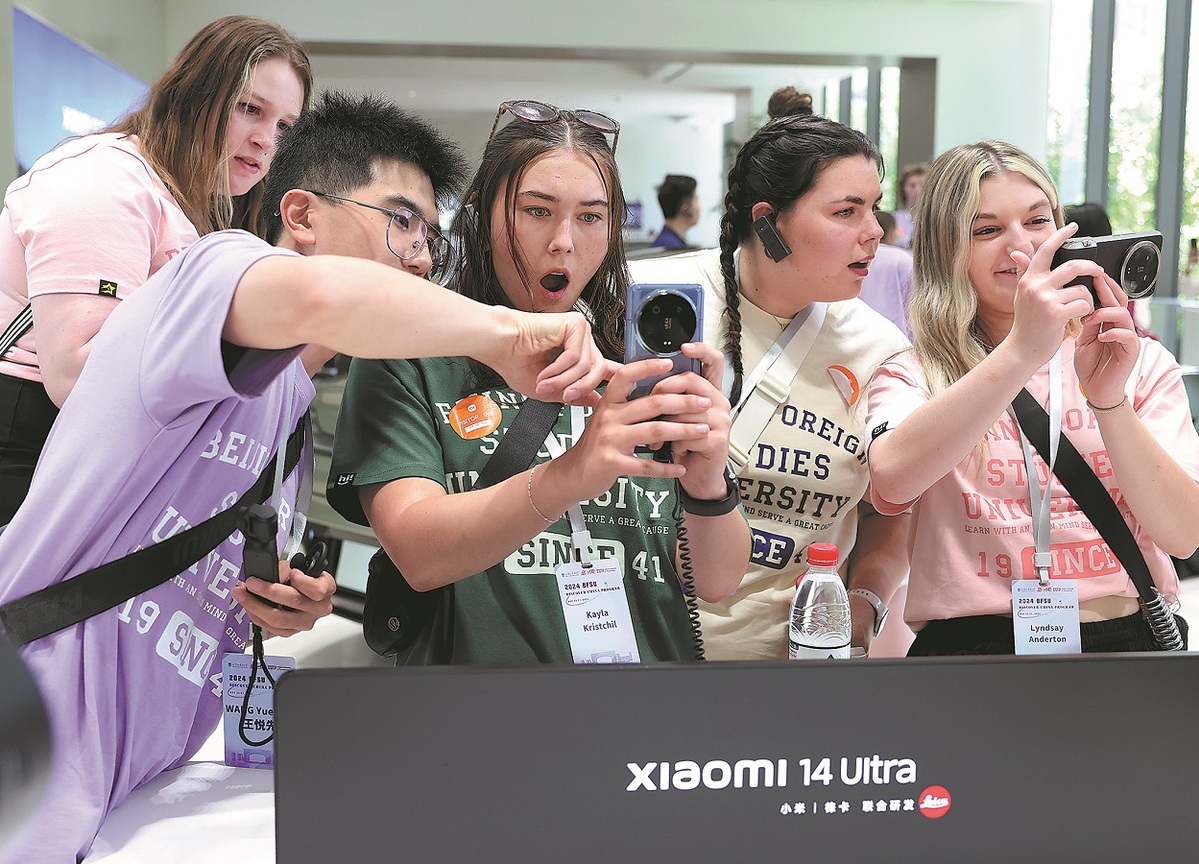
Students try out Xiaomi smartphones in the industrial park. (ZOU HONG/CHINA DAILY)
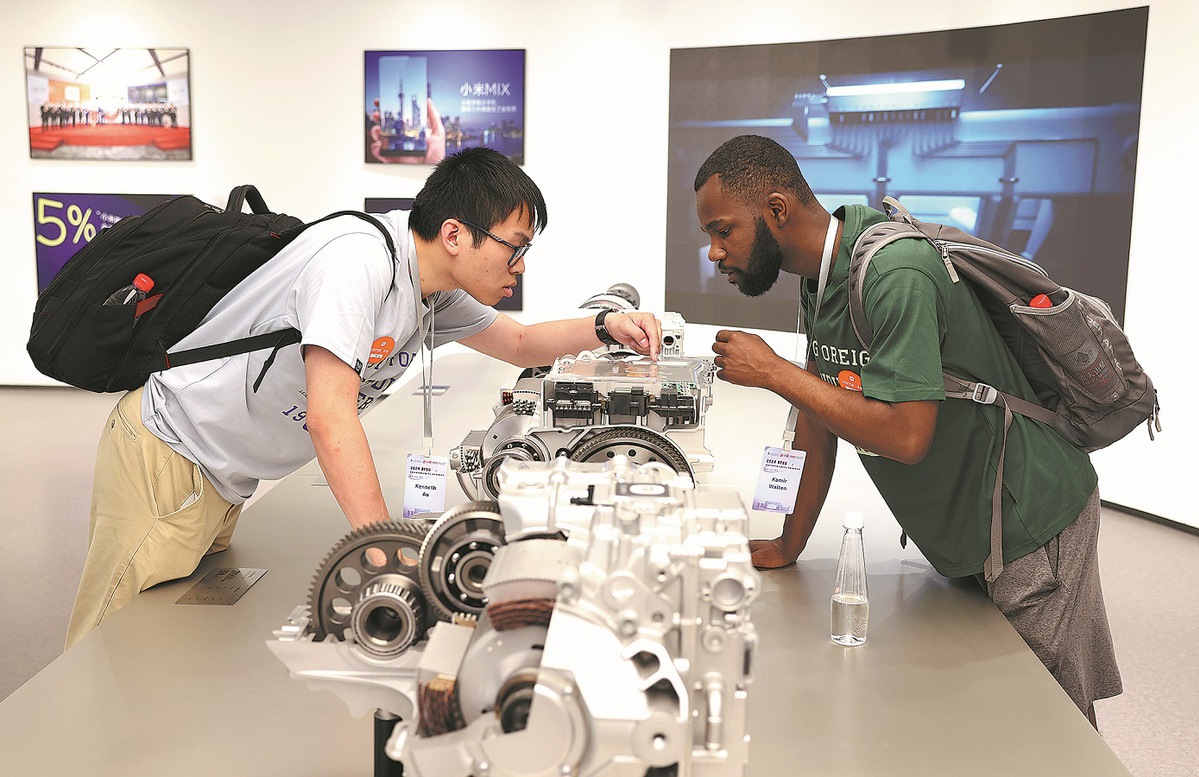
Kenneth Au (left) and Kamir Walton (right) from Indiana University of Pennsylvania learn about car engine components while visiting Xiaomi's industrial park in Beijing on May 20. (ZOU HONG/CHINA DAILY)
Photos
Related Stories
- China opposes U.S., other Western countries shifting blame over Ukraine crisis
- Feature: Tree planting on hills of Kuliang highlights Sino-U.S. bonds
- Ministry of National Defense: Strategic dialogue between PLA NDU and US NDU ongoing in Washington
- Ministry of National Defense's response to US threats and intimidation: Never work on us
- Chinese scholars slam U.S. act concerning Xizang
- Chinese defense spokesperson criticizes U.S. as "source of lies"
Copyright © 2024 People's Daily Online. All Rights Reserved.






